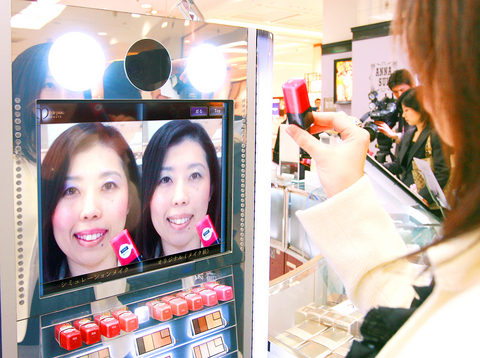Tech-savvy but fashion-conscious Japanese women who want to try an instant makeover discreetly now have a chance to do it at the touch of a button.
In a project meant to help design "the department store of the future," Japan's top cosmetics maker Shiseido Co yesterday launched with partners a virtual make-up simulator on a trial basis.
The customer's face appears on the computer and moves in real-time as she tries on lipstick, eyeshadow or blush at the top of the screen.

PHOTO: AFP
"This is the first time to be able to do this with moving images instead of still images," Shiseido spokesman Shigesato Kobayashi said.
The customer touches on-screen tags that offer information about the products, including what ingredients are included or what skin type they are suited to.
The screen will also show the before and after results of the makeover, "so women can apply and reapply different kinds of color without having to use make-up remover and compare the results instantly," Kobayashi said.
The technology, developed by high-tech giant Fujitsu Ltd and supported by the Ministry of Economy, Trade and Industry (METI), will be offered on a trial basis until the middle of next month at Mitsukoshi department stores in Tokyo's ritzy Ginza area and the central city of Nagoya.
The technology also assists companies by showing them the popularity of products.
But Shiseido acknowledged that technology would never replace human counseling.
"This is simply an addition to make-up counseling," Kobayashi said. "Of course, we need real cosmeticians to tell which color works best with a person's skin color and how to put on make-up correctly."

MORE VISITORS: The Tourism Administration said that it is seeing positive prospects in its efforts to expand the tourism market in North America and Europe Taiwan has been ranked as the cheapest place in the world to travel to this year, based on a list recommended by NerdWallet. The San Francisco-based personal finance company said that Taiwan topped the list of 16 nations it chose for budget travelers because US tourists do not need visas and travelers can easily have a good meal for less than US$10. A bus ride in Taipei costs just under US$0.50, while subway rides start at US$0.60, the firm said, adding that public transportation in Taiwan is easy to navigate. The firm also called Taiwan a “food lover’s paradise,” citing inexpensive breakfast stalls

TRADE: A mandatory declaration of origin for manufactured goods bound for the US is to take effect on May 7 to block China from exploiting Taiwan’s trade channels All products manufactured in Taiwan and exported to the US must include a signed declaration of origin starting on May 7, the Bureau of Foreign Trade announced yesterday. US President Donald Trump on April 2 imposed a 32 percent tariff on imports from Taiwan, but one week later announced a 90-day pause on its implementation. However, a universal 10 percent tariff was immediately applied to most imports from around the world. On April 12, the Trump administration further exempted computers, smartphones and semiconductors from the new tariffs. In response, President William Lai’s (賴清德) administration has introduced a series of countermeasures to support affected

CROSS-STRAIT: The vast majority of Taiwanese support maintaining the ‘status quo,’ while concern is rising about Beijing’s influence operations More than eight out of 10 Taiwanese reject Beijing’s “one country, two systems” framework for cross-strait relations, according to a survey released by the Mainland Affairs Council (MAC) on Thursday. The MAC’s latest quarterly survey found that 84.4 percent of respondents opposed Beijing’s “one country, two systems” formula for handling cross-strait relations — a figure consistent with past polling. Over the past three years, opposition to the framework has remained high, ranging from a low of 83.6 percent in April 2023 to a peak of 89.6 percent in April last year. In the most recent poll, 82.5 percent also rejected China’s

PLUGGING HOLES: The amendments would bring the legislation in line with systems found in other countries such as Japan and the US, Legislator Chen Kuan-ting said Democratic Progressive Party (DPP) Legislator Chen Kuan-ting (陳冠廷) has proposed amending national security legislation amid a spate of espionage cases. Potential gaps in security vetting procedures for personnel with access to sensitive information prompted him to propose the amendments, which would introduce changes to Article 14 of the Classified National Security Information Protection Act (國家機密保護法), Chen said yesterday. The proposal, which aims to enhance interagency vetting procedures and reduce the risk of classified information leaks, would establish a comprehensive security clearance system in Taiwan, he said. The amendment would require character and loyalty checks for civil servants and intelligence personnel prior to